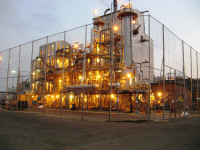Jord Proxa Africa (Pty) Ltd
Crystallisation

Crystallisation is the process of recovering a pure compound from a pure or impure solution in the form of discrete crystals (except in the case of ZLD crystallisers where multiple components co-crystallise). The distinction between crystallisation and precipitation is that the latter is not a surface growth phenomenon. Crystallisation utilises the property of solubility of the solute in the solvent and generation of crystals through either cooling or evaporation of the solvent. The design of crystallisers is strongly influenced by the characteristics of each material handled. Each unit comprises a number of unique process and mechanical features to ensure optimal crystal yield, size, particle size distribution, crystal purity and operating cycle. To meet these needs, crystallisers tend to fall into two main classifications; continuous and batch. Most plants today use continuous crystallisers wherever possible.
Forced circulation crystallisers are the simplest and most widely used and are applicable to processes where high rates of evaporation are required. They are suitable for products that grow readily or where particle size and distribution is not a critical factor. Typical applications include the crystallisation of:
- sodium chloride
- sodium carbonate
- sodium sulphate
- citric acid
- nickel sulphate
- sodium nitrate
- mixed salts (ZLD) applications
Growth (Baffle) crystallisers are employed where superior control over crystal size distribution is required. These units are characterised by the large crystal size achieved and long operating cycles. Typical products include:
- ammonium sulphate
- potassium chloride
- potassium sulphate
- sodium chlorate
- boric acid
- potassium dichromate
- sodium dichromate
Cooling crystallisers are specifically used on applications where hydrated crystals are produced only at low temperatures for example:
- sodium sulphate decahydrate
- sodium carbonate decahydrate
- ferrous sulphate septahydrate
- cobalt sulphate septahydrate
- magnesium sulphate septahydrate
- magnesium sulphate hexahydrate
Typically, these applications use conventional heating, cooling and/or energy-efficient techniques like vapour recompression and thermo-recompression for optimisation of utility consumption.
Click here for more Product Details from
Jord Proxa Africa (Pty) Ltd...